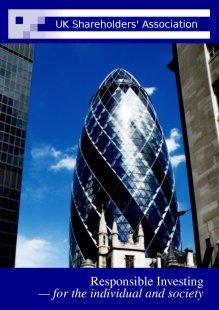News Archive: 2018
We have revised our privacy policy in line with the General Data Protection Regulation (GDPR). It can be viewed here.
UKSA's Policy Director Peter Parry and Cliff Weight, his opposite number at ShareSoc, have jointly sent letters to the Financial Times, the Financial Reporting Council and the Financial Conduct Authority concerning Aviva's proposal to cancel 450 million irredeemable preference shares.
The letter published in the Financial Times, together with…
We have read the document ‘FCA Mission – Our Approach to Competition’. Our responses to the questions set out in the document are shown here.color>
Mercer, an influential provider of advice for pension schemes, has said asset managers should pay investors to run their portfolios and provide performance guarantees instead of earning fees regardless of the returns.This is according to the Financial Times, whose report (paywall) can be found here.
UKSA and ShareSoc have submitted comments in response to the FRC’s consultation on its draft strategy and budget for 2018.
UKSA and ShareSoc have issued a joint response to the FRC's consultation paper on the Corporate Governance Code.
The Carillion collapse was entirely predictable to experienced private investors. As were the reasons for it. Perhaps that’s why special interests have ensured that we are excluded from consultations and denied voting rights?
An article by John Kay for the Financial Times reveals a nonsense in the Key Issue Document (KID) that is now mandatory for all funds. It raises a question mark over the competence of all those involved in its design and approval.
UKSA has signed a letter to the Financial Times exposing once again the hole at the heart of modern accounting: the loss of the prudence principle.

